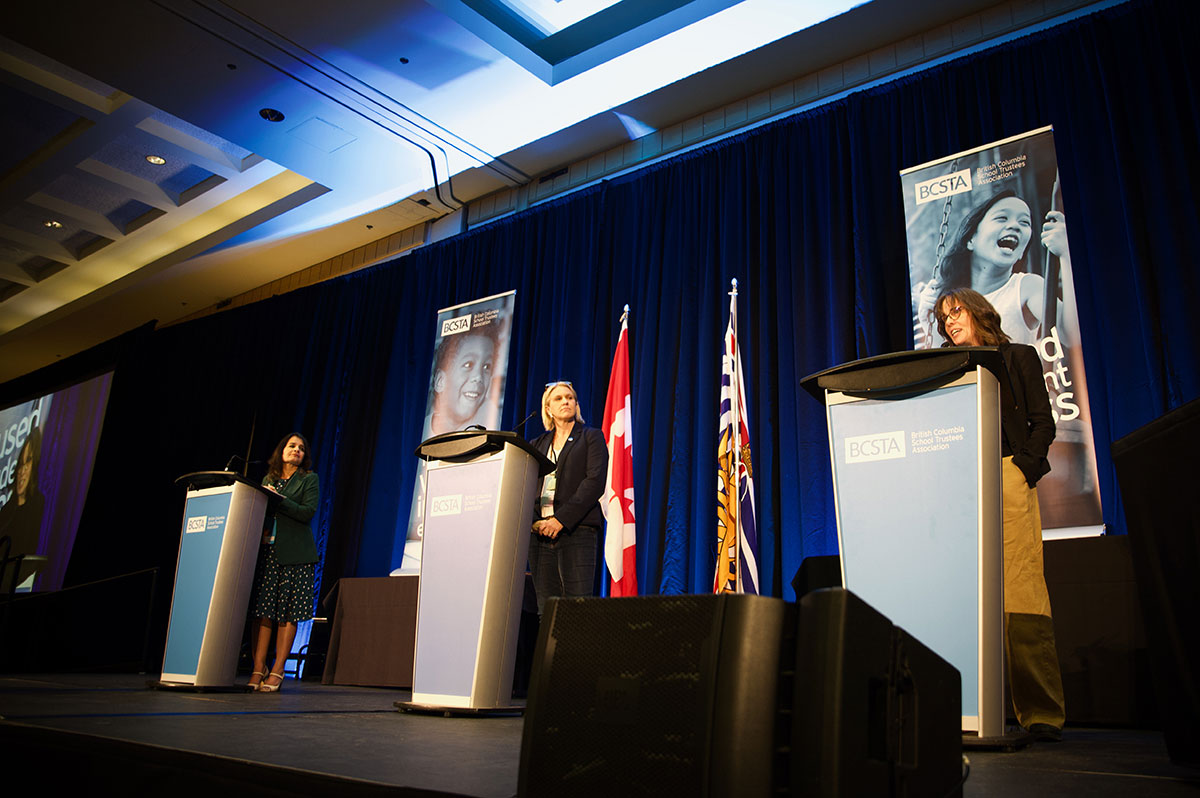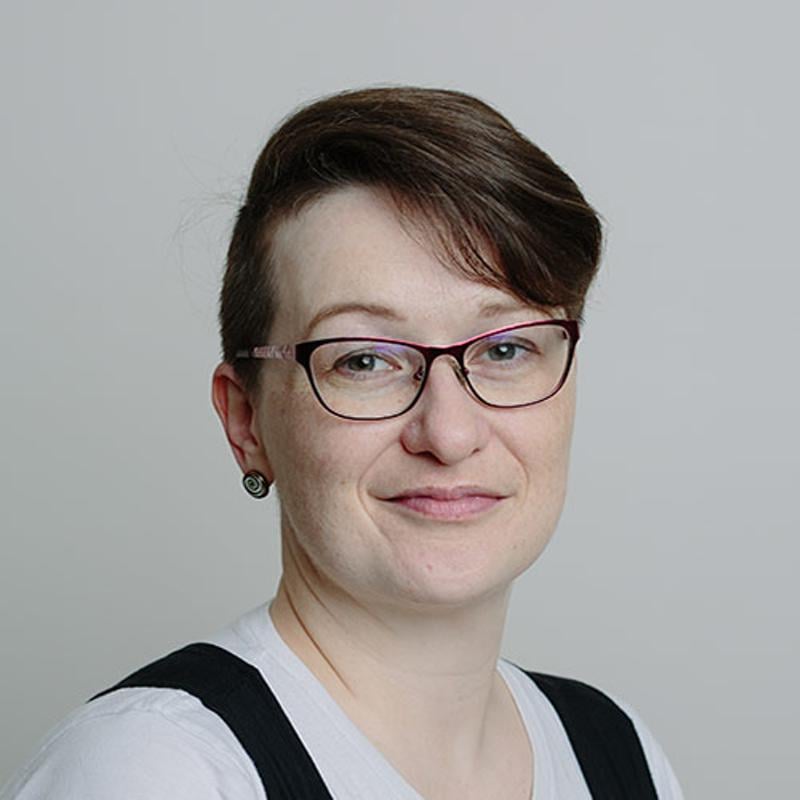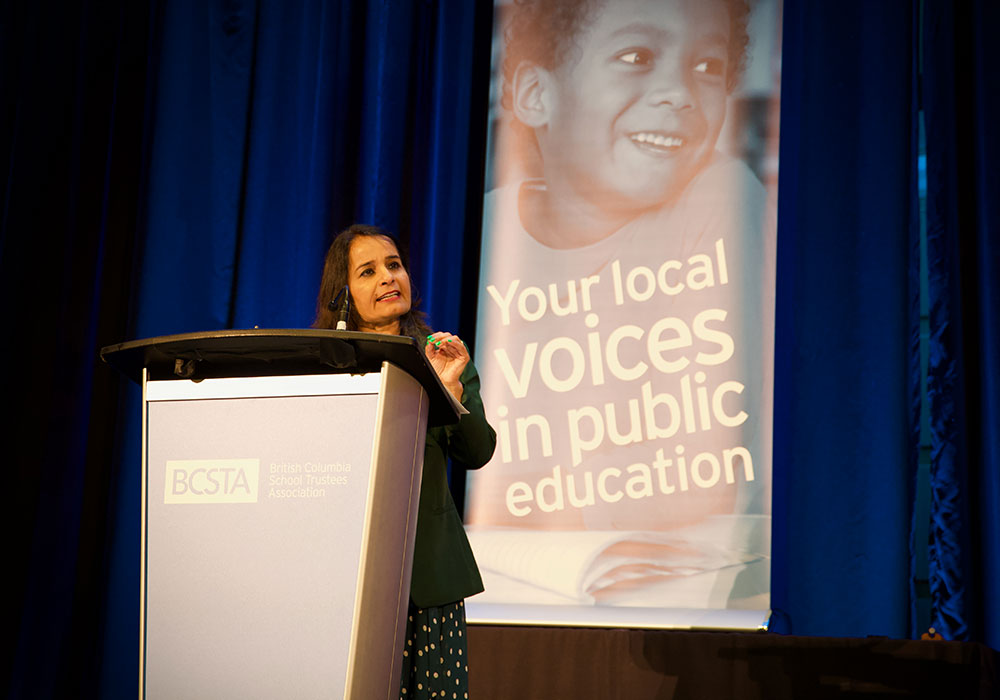No party platforms. No interrupting or shouting over each other. No ad hominem attacks.
Last Friday, six months out from the provincial election, the British Columbia School Trustees Association hosted a forum at Vancouver’s Westin Bayshore hotel on the challenges facing provincial school districts.
The forum featured three B.C. MLAs answering trustee-provided questions about public education: Education Minister Rachna Singh, NDP MLA for Surrey-Green Timbers; Elenore Sturko, South Surrey MLA and opposition education critic with BC United; and Sonia Furstenau, MLA for Cowichan Valley and leader of the BC Green Party.
Only sitting MLAs were invited to participate. The BC Conservatives, which currently has two sitting MLAs in the legislature, were invited but unable to attend.
Part of the association’s annual general meeting conference in Vancouver, the Education Matters Forum was explicitly not a debate.
“The writ has not dropped and not everybody has their platforms finalized,” Carolyn Broady, president of the BC School Trustees Association, told The Tyee after the forum. The association will release video clips from the forum in the near future.
“We are trying to increase the profile of public education in the upcoming provincial election. So this was a first step.”
The MLAs were given questions in advance, though they did not know which ones they would be asked. The questions focused on three main priority areas, based on a poll of provincial trustees: teacher recruitment and retention; capital costs and deferred maintenance; and support for vulnerable students.
Each MLA had 90 seconds to respond, with the opportunity to make two additional one-minute responses each during the one-hour forum.
“This is our future and this is how we build a stronger province. And we all need to collaborate and focus on the best outcomes,” said Furstenau, a former teacher, about the format in her opening remarks. “You’ll see the three of us are very capable of having a good conversation.”
This was not the first time sitting MLAs and ministers have addressed the BC School Trustees Association AGM during an election year, said Broady, who is also a trustee and chair of the West Vancouver school board. But it was the first time MLAs from multiple parties participated in a forum discussion.
“Listening to [the MLAs], they all have the best of intentions. It’s really going to be about funding,” she said.
School staffing shortages
In the midst of an ongoing teacher and education assistant shortage in B.C., the trustees’ association asked the MLAs how they would tackle teacher recruitment and retention.
The labour shortage is a global issue, Singh said. But she added she’d been in discussions with stakeholders about potential solutions, such as fast-tracking international credential recognition and teacher certification, and providing teacher training closer to rural and remote communities to facilitate more Indigenous people becoming teachers.
Singh added that additional investments will be needed to attract and retain teachers in northern B.C., where the shortage is the most acute.

For Sturko’s part, she acknowledged that BC United’s election platform is still under wraps and she did not want to provide “spoilers.” But she promised “creative solutions” for recruiting and retaining teachers, especially in rural and remote areas.
“We really have to make sure we’re… [supporting] educators at every level, so that once we do get them into the system, that they’re there for the long haul,” Sturko said, referencing the stress teachers are under.
Unlike Furstenau, both Sturko and Singh’s parties have formed governments in B.C. and had momentous, lasting impacts on the provincial education system.
In 2016 the Supreme Court of Canada ruled the former BC Liberals, now BC United, had illegally stripped teachers’ contracts of class size and composition language, as well as teacher-to-student staffing ratios. This ruling marked the culmination of a contentious relationship between the teachers’ union and the then-governing Liberals.
In an interview with The Tyee following the forum, Sturko, who was first elected as an MLA in 2022, said BC United is looking forward, not back, when it comes to their relationship with educators.
“We’re not interested in going backwards in any way,” she said.
Supporting ‘vulnerable’ students
The forum also included questions about how the politicians would “prioritize inclusion and diversity” in schools to ensure all students “feel safe, respected and valued,” as well as how education can further reconciliation with Indigenous peoples.
Furstenau spoke about diversity, equity and inclusion being the baseline required for everyone to thrive in the education system. Especially for students with disabilities who require additional supports like education assistants, of which there is a shortage in the province. As well as Indigenous students whose graduation rates, while consistently improving, are still lower than other students’ overall.
“We have to ensure our curriculum, what we’re teaching and how we’re teaching, also reflects that inclusion and diversity,” she said, adding her own daughter learns more Indigenous history in school than Furstenau ever did.
Sturko noted her own school textbooks had been “racist” about Indigenous peoples and their histories, and that she is “proud” of the partnership between government and the First Nations and Métis who have contributed to updating the curriculum to accurately reflect their experiences and cultures.
Singh, who has been education minister since 2022, referenced her ministry’s anti-racism action plan, as well as the new Indigenous-focused graduation requirement that sees all secondary students complete at least four credits in Indigenous-focused course work in order to graduate, as some of her portfolio’s successes.
She also spoke about the recent announcement of $30 million for early literacy education for students with learning disabilities, such as dyslexia.
“I know that there’s much more work to do to create those inclusive spaces. I’m looking forward to getting to work with all of you… to make our schools more accessible and more inclusive,” Singh told the assembled crowd.
Seeking more capital and seismic resources
The MLAs were asked what they would say to school boards looking for more money for capital expenses like new schools, seismic upgrading of existing schools and deferred maintenance expenses.
As of this month, 225 schools in B.C. have undergone seismic upgrades. There are 245 schools that need seismic upgrades, but have made no progress towards them. Another 28 schools have upgrades in progress.
Sturko cited her own overcrowded riding in Surrey, and how they have run out of room for portable classrooms. Some secondary schools, including the one her own kids are set to attend, will take students in staggered start times to make space.
“The reality is that when we don’t put the investment in… it has trickle-down effects beyond just their learning outcomes,” she said, including for students’ and families’ mental health.
BC United has already committed to getting capital projects approved and finished faster, Sturko added. Later she noted when governments cite “historic investments” in education capital, the phrasing is redundant as investments will be “historic” as long as districts and costs continue to grow.
“If it is not enough, we are definitely negatively impacting [the district],” she said.
Furstenau suggested the government provide a few pre-approved school design templates to choose from, speeding up the development process for new builds.
“And we can get those approvals and that work done much more efficiently than what it takes right now with the whole lengthy process to even get to the design,” she said.
Singh, whose riding is also in Surrey, said her ministry has invested $4 billion into capital projects for districts. In addition to adding portables, the province is now investing in prefabricated classrooms that, unlike portables, can include washrooms and hallways, and are permanent additions to overcrowded schools.
“Since last six years, the investments that we have made in Surrey, the schools that we have been able to open in Surrey, is much more than what happened in the [previous] 16 years,” Singh said to Sturko, referencing the BC Liberal’s years in power before the NDP were elected in 2017.
“A lot has been done, much more to do,” Singh added.
Student safety, health and addiction education
Results from the recently released 2023 BC Adolescent Health Survey showed the percentage of youth rating their mental health as “good” or “excellent” is on the decline. Meanwhile unregulated drug deaths have become the leading cause of death in B.C. for anyone ages 10 to 59.
The politicians were asked how they would ensure students receive the mental health and addictions support and education they require, that is tailored to them.
Furstenau called for an increase in the number of school psychologists and counsellors in each district to meet the mental health challenges facing students. For addictions, she called for “honest and frank conversations with kids” about illicit drugs.
We can’t assume that kids are “separated” from the illicit drug supply, Furstenau said.
“It is affecting all of our communities,” she said. “We know that ‘Just Say No’ campaigns and wars on drugs have not delivered the outcomes we need to elevate the capacity for kids to get the supports before they’re in crisis, before they’re turning to drugs as a solution.”
Sturko, a former RCMP officer who has been critical of B.C.’s safer supply program and the province’s decriminalization of small amounts of illicit drugs told the assembled trustees that harm reduction is “an important pillar.” But, she added, more effort needs to be put into prevention.
“Prevention is key to us getting ahead of this crisis that we are in,” Sturko said, adding she also supports increasing access to mental health resources for kids in and out of schools.
“We know that seven people a day are dying of overdose, mostly from illicit fentanyl. But how did these individuals start using drugs? We need to study that more robustly… and invest in areas where we can actually get ahead of it and provide the appropriate supports.”
Both Furstenau and Sturko gave The Tyee short post-forum interviews; Minister Singh was not available.
We asked both about how they would respond to parents upset with how districts respond to sexual assault between students, inspired by recent media reports of such incidents in B.C., including on The Tyee.
“Kids and parents need to be assured that they are in a safe place,” Furstenau said of schools.
“There has to be ongoing training and professional development for teachers and administrators for how they are not just responding, because that’s reactive, but proactively ensuring that kids are informed, empowered and understand what is and is not acceptable behaviour, what the consequences will be, and the consequences have to be serious and followed through.”
Sturko echoed prevention work through education and laying out consequences, adding families and law enforcement must be included in “determining a path forward” when sexual assault occurs between students.
“Safety and even mental safety” for students who are assaulted “has to be a paramount consideration,” Sturko said. “We need to do everything we can to educate kids about sexual assault.” ![]()
Read more: Education, BC Politics

















Tyee Commenting Guidelines
Comments that violate guidelines risk being deleted, and violations may result in a temporary or permanent user ban. Maintain the spirit of good conversation to stay in the discussion and be patient with moderators. Comments are reviewed regularly but not in real time.
Do:
Do not: